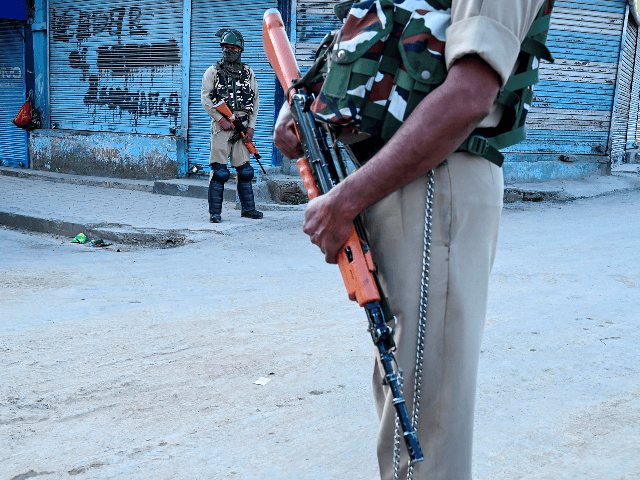Authorities intensified the weeks-long security lockdown in New Delhi-administered Kashmir ahead of protests Friday incited by separatists after India stripped the Muslim-majority area of statehood.
On Friday, Reuters reported:
Authorities in the main city of Indian Kashmir tightened security ahead of Friday prayers after separatists called for a protest march to a U.N. office, with streets bristling with paramilitary personnel and some blocked by checkpoints.
Posters appeared overnight this week in Srinagar, the Muslim-majority region’s main city, calling for a march to the office of the U.N. Military Observer Group for India and Pakistan (UNMOGIP), to protest against India’s revocation of Jammu and Kashmir state’s special autonomy.
…
On Friday, several dozen paramilitary personnel manned at least two barriers on the main road leading to the office of UNMOGIP in Srinagar and public movement around it was blocked. Entry into the city’s old quarter, which has long been a center for protests, was severely curtailed, as policemen blocked street after street with concertina wire.
The United Nations established the UNMOGIP in 1949 as a peace keeping mission in the wake of the first war between India and Pakistan over Kashmir.
Officials from the U.N. group “supervise the ceasefire between India and Pakistan” in Kashmir, the international body noted.
Despite a 2003 ceasefire, India and Pakistan regularly clash along the border that divides most of the region between the two rivals.
Nuclear-armed India, Pakistan, and China all have competing claims to the Himalayan region of Kashmir, but New Delhi and Islamabad claim the area in its entirety.
India and Pakistan have fought two wars. China and India have also engaged in a significant military conflict over the region, resulting in Beijing’s occupation of territory on India’s side of the main Kashmir border. Pakistan has ceded control of some of its Kashmir lands to China.
The Kashmir stakeholders, namely India and China, have warned of a potential nuclear war over the region.
Critics accuse the Hindu nationalist ruling government in India of cracking down on Kashmir because it is a predominantly Muslim area.
The United States has recently accused the ruling Indian government of inciting violence against Muslims.
Earlier this week, separatist leaders in Indian Kashmir called on residents of the region to defy a ban on demonstrations and join a mass march after Friday prayers.
On Wednesday, Reuters described the move as the “first such call since the [Indian] federal government revoked the region’s autonomy, stirring anger in the region and beyond.”
New Delhi rescinded India Kashmir’s special autonomy status on August 5 amid a security lockdown and communication blackout that reportedly continues.
The communication blackout includes the blocking of phone lines, the internet, and news outlets.
New Delhi has reportedly lifted the restrictions from the Hindu-majority areas of Indian Kashmir.
India also deployed thousands of security forces to the area ahead of the move.
As part of its crackdown, authorities in Indian Kashmir have detained at least 2,300 people, including pro-India politicians and separatists, the Associated Press (AP) revealed this week.
Reuters learned from the region’s two main hospitals that tear gas and pellets used by Indian forces have resulted in at least 152 injuries this month.
U.S. President Donald Trump has repeatedly offered to mediate between India and Pakistan. India has rejected the offer, arguing that the overall Kashmir issue is a bilateral matter for New Delhi and Islamabad to resolve. New Delhi has also said revoking Indian Kashmir’s autonomy is an internal matter.
Meanwhile, China and Pakistan argue that it is an international issue, urging the United Nations to get involved.
Protesters have plagued Indian Kashmir over the last two weeks at times involving hundreds of people.
India accuses Islamabad of backing jihadis and separatists in Kashmir seeking independence or a merger with Pakistan.
Meanwhile, Pakistan blames India for killing civilians and committing human rights violations against dissenters in the region.

COMMENTS
Please let us know if you're having issues with commenting.